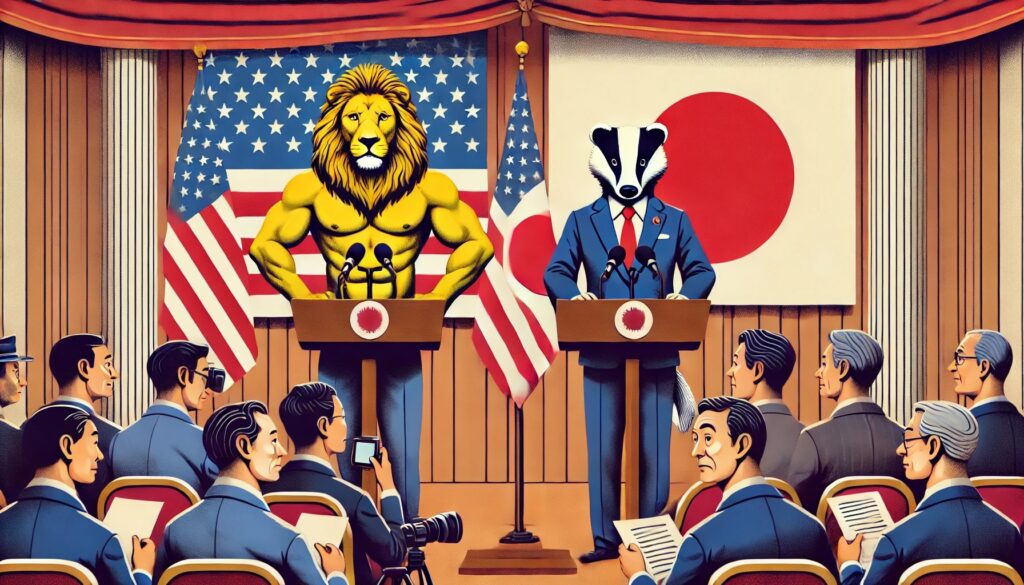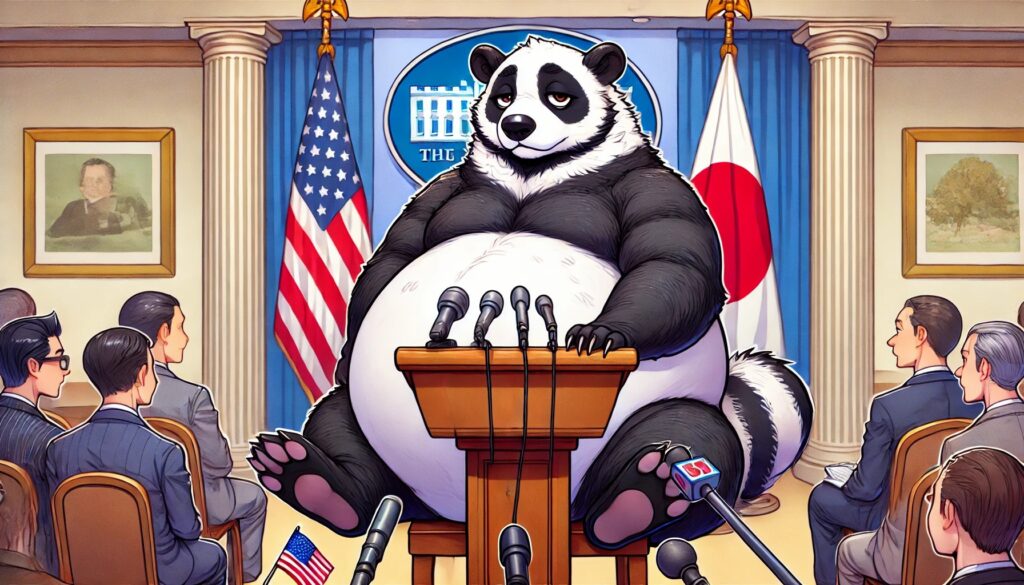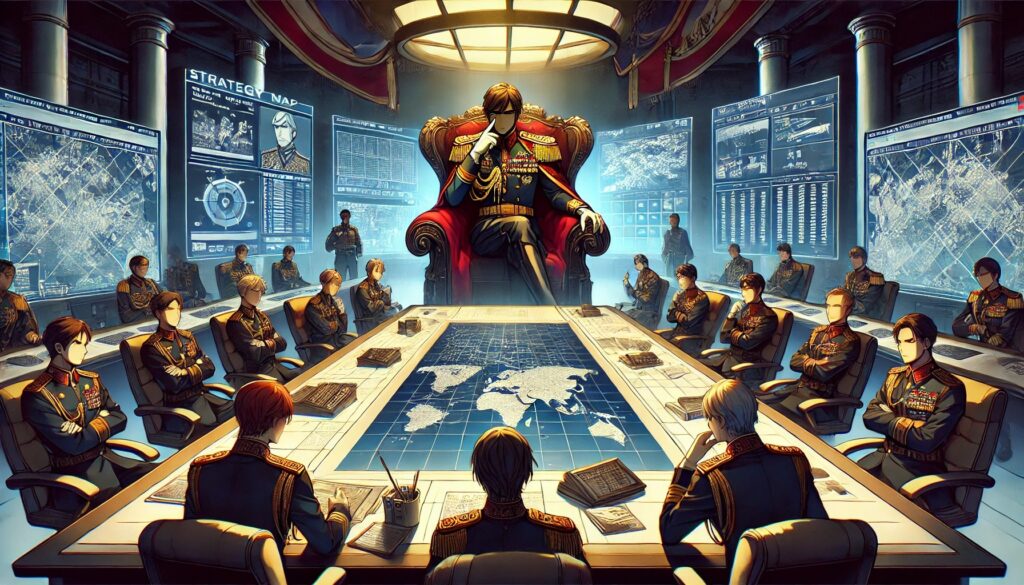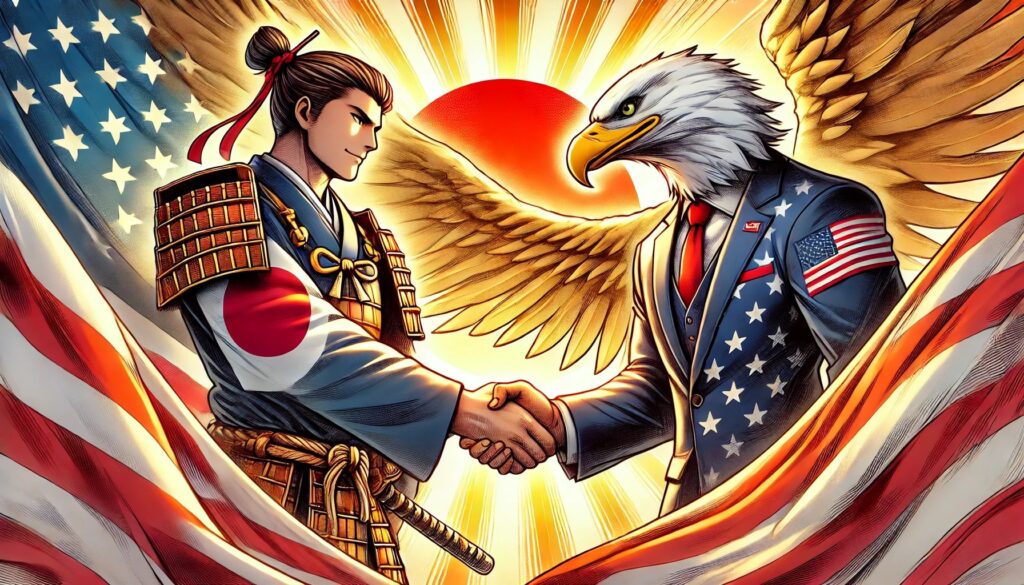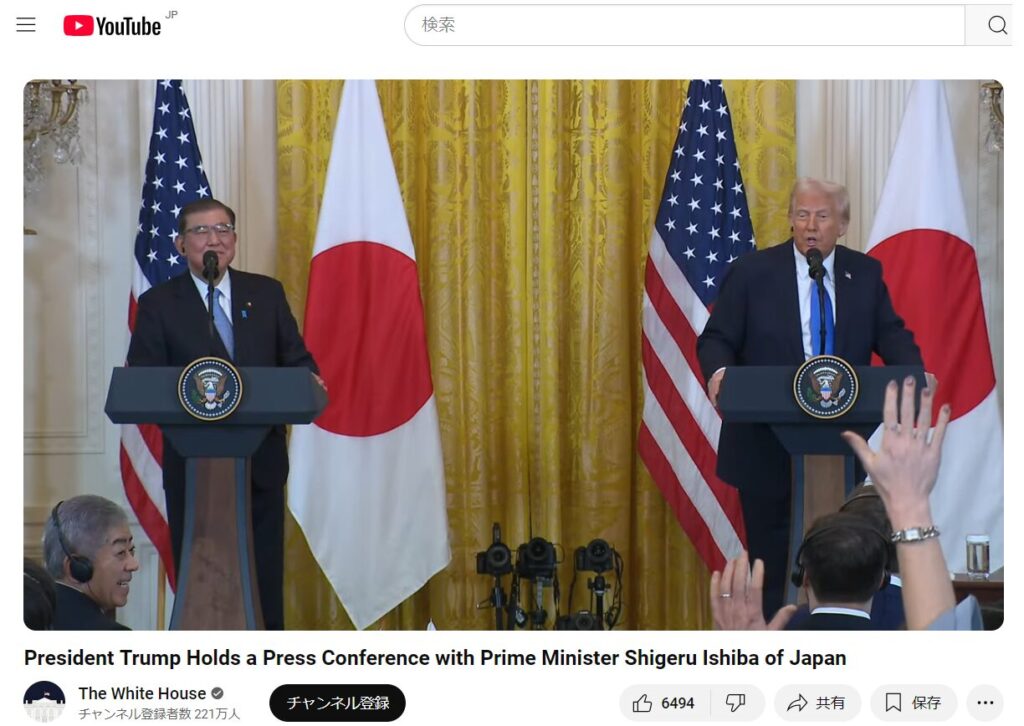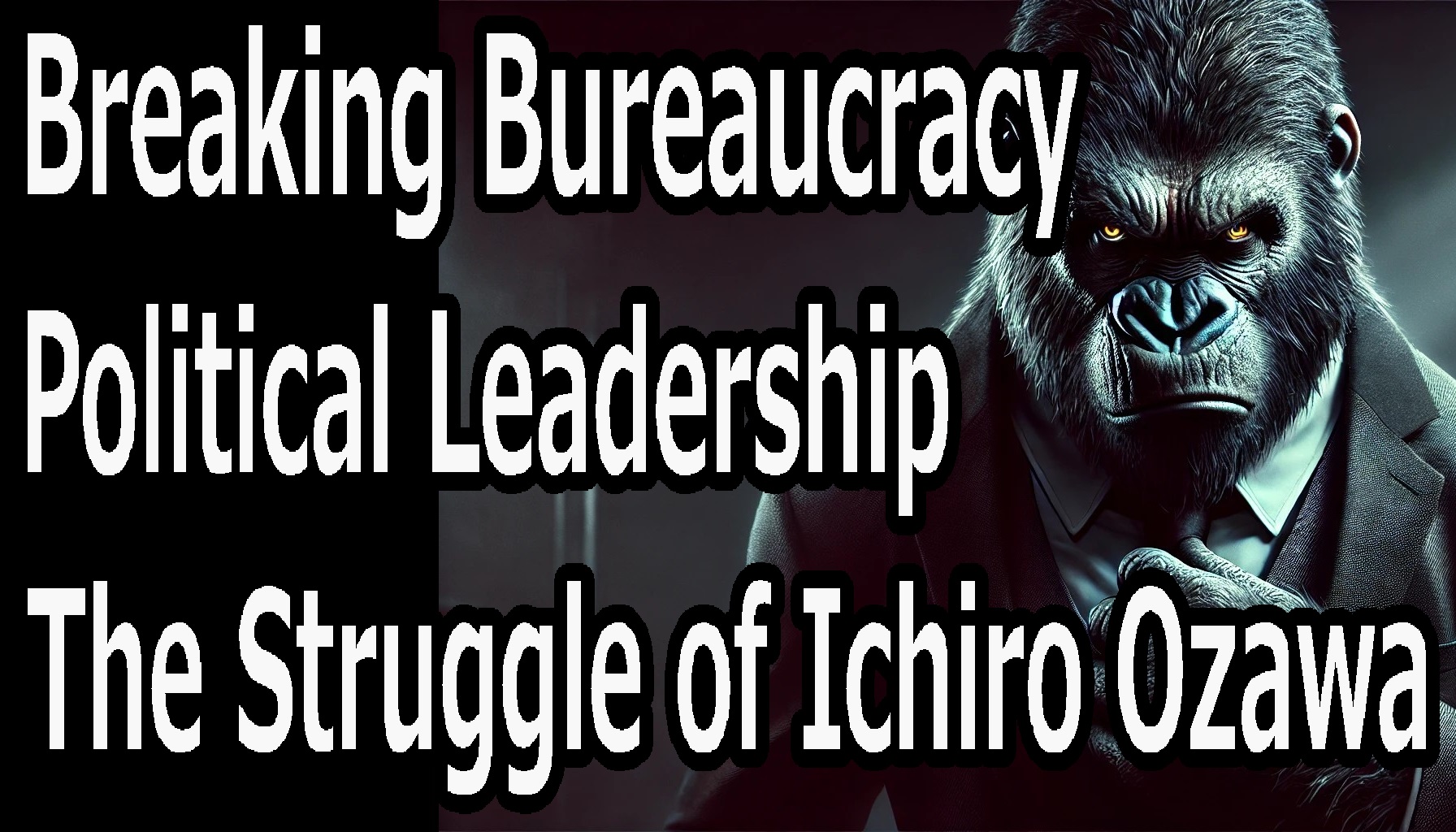Very Good Answer!
During the joint press conference between Prime Minister Ishiba and President Trump, an unusual turn of events occurred when Trump abruptly ended the conference over a question about tariffs. As Prime Minister Ishiba avoided giving a concrete answer, Trump smiled and commented, “That is a very good answer,” before removing his earpiece and walking out. In Western diplomatic settings, this could be perceived as “rude,” and at the very least, it suggests that the meeting was not a great success.
Vague Answers
In Western culture, failing to provide a clear answer to a question is often regarded as “ignorance” or “irresponsibility.” While “reading the atmosphere” (“sontaku”) is considered a virtue in Japan, Western cultures place less emphasis on such implicit communication and expect explicit opinions. Therefore, Ishiba’s vague response to the question on tariffs might have reinforced Japan’s image of weak negotiation skills.
Recalling Japan’s Wartime Diplomacy
This kind of ambiguous response has had serious consequences in history. Toward the end of World War II, the Japanese government did not clearly respond to the Potsdam Declaration, leading the U.S. to interpret it as a rejection. This misunderstanding ultimately resulted in the tragic atomic bombings. This historical lesson underscores the critical importance of providing clear responses in diplomacy.
Unnecessarily Long-Winded Answers
Ishiba’s behavior during the press conference also drew criticism. His posture during the photo session and his unnecessarily lengthy responses raised questions about his leadership qualities on the international stage. In Western press conferences, concise and to-the-point answers are expected, and overly long explanations can be counterproductive.
Japan’s Delayed Response
This summit did not yield any significant achievements for Japan, leaving the impression that Japan had “fallen behind.” Thanks to Akie Abe, the groundwork for the meeting had already been laid, yet it was postponed, leading to a major missed opportunity. If the meeting had taken place before January 20, before Trump’s inauguration, its lack of substance would not have been as problematic.
Trump is Already Implementing Policies
However, the Trump administration has been swiftly executing major policies, and Japan has clearly fallen behind in this momentum. Particularly, the mention of “reciprocal tariffs” could have a significant impact on Japan’s economy.
Challenges in Japan’s Diplomacy
This meeting highlighted Japan’s diplomatic challenges. Moving forward, a more proactive approach and clear messaging will be necessary. In order to protect national interests, strengthen Japan-U.S. relations, and secure Japan’s position in the international community, strong leadership is essential.
During Trump’s remarks on tariffs, Foreign Minister Iwaya was caught on camera smiling broadly while standing in front of Ishiba. What did this smile mean?
No Handshake, Press Conference Abruptly Ends
The joint press conference between Prime Minister Ishiba and President Trump ended suddenly. Reviewing the footage, Trump was seen listening intently to the question on tariffs through his earpiece.
However, when Ishiba dodged the question, Trump responded with a smile, saying, “That is a very good answer.” He then removed his earpiece and immediately followed with, “Very good answer, wow. That’s very good, he knows what he’s doing. Thank you very much, everybody, thank you.” Without shaking hands or even looking at Ishiba, he left the stage.
Ishiba, seemingly unaware of what had just happened, looked around in confusion before being approached by an interpreter. This scene may only be visible in the uncut version available on NicoNico. Even the White House’s official footage had cut this part, and Japanese media also stopped their coverage at the “very good answer” moment.
In diplomacy, such an abrupt conclusion is highly unusual. In Western cultures, such behavior in an official setting is often considered “rude,” raising the possibility that Ishiba’s response did not meet Trump’s expectations.
In fact, the tariff issue is a crucial negotiation point for the U.S., and rather than offering a vague response, Ishiba should have presented a clear position. However, Japan’s ambiguous stance ultimately led Trump to unilaterally end the conference.
In the West, Not Expressing an Opinion is Seen as Ignorance
In Western culture, failing to provide a clear answer to a question is often considered “ignorance” or “irresponsibility.” In business and politics, leaders who do not clearly state their opinions often lose credibility. In past international meetings, Japanese politicians have been criticized for being too vague in their statements.
There is a significant difference between Western cultures, where “expressing one’s opinion clearly” is valued, and Japanese culture, where “vague responses are acceptable.” From a Western perspective, Ishiba’s response to the tariff question might have given the impression of “not thinking,” “avoiding the issue,” or “lacking leadership.”
Even if there is a possibility of disagreement, saying “In my view…” or “My opinion is…” is important. Otherwise, silence can be interpreted as “having no thoughts” or “lacking decisiveness.”
The Danger of Vague Responses – The Lesson of the Potsdam Declaration
Ishiba’s vague response to the tariff question recalls Japan’s reaction to the Potsdam Declaration at the end of World War II.
On July 26, 1945, the U.S., U.K., and China (later joined by the Soviet Union) issued the “Potsdam Declaration,” demanding Japan’s unconditional surrender. The declaration warned that Japan would face “utter destruction” if it did not immediately surrender.
However, Prime Minister Kantaro Suzuki stated, “We have no comment on the Potsdam Declaration and have no intention of addressing it officially.” The Japanese government effectively “ignored” the declaration, which the U.S. interpreted as a “rejection,” leading to the atomic bombings.
This historical example shows that failing to provide a clear response in diplomacy can lead to catastrophic consequences.
Prime Minister Ishiba’s Communication Issues
During this press conference, Prime Minister Ishiba’s communication issues also became evident. When he received a photograph from President Trump, Ishiba made no comment, merely showing it briefly to the reporters before putting it away. In such a situation, even a simple remark like “This photo is a lifelong treasure” or “I will cherish this dearly” could have helped create a warmer atmosphere.
Reviewing the footage, it is evident that President Trump was waiting for a reaction. However, Prime Minister Ishiba did not respond and, after briefly showing the photo, simply placed it on the desk. This scene raises questions about his interpersonal skills, regardless of his title.
Additionally, during the press conference, Ishiba tended to give overly long responses to reporters’ questions. In Western press conferences, concise and to-the-point answers are expected, and excessive verbosity can cause unnecessary confusion. In fact, comments on NicoNico Video included criticism such as ‘too long’ and ‘get to the point.’
Furthermore, his posture and gaze during the photo session were also problematic. In the photograph with President Trump, Ishiba appeared to be standing at an angle with his head slightly tilted downward. On the international stage, it is important to stand upright and project an image of equal standing with counterparts. Such subtle details can influence the perception of leadership in the global community.
Japan’s Slow Response and Missed Opportunities
The recent summit between Japan and the U.S. left Japan appearing “behind the curve.” Ishiba had a chance to meet with Trump before January 20, but that opportunity was missed.
Had the meeting taken place before Trump’s inauguration, the lack of concrete results would not have been an issue. However, since Trump is already implementing policies at full speed, Japan now faces the risk of being left out of key negotiations.
Particularly, Trump explicitly stated that “reciprocal tariffs” would be introduced and that an announcement would come on Monday or Tuesday. This statement carries significant implications, yet it has received little coverage in Japan.
What demands will be made on Japan?
This Japan-U.S. summit and press conference highlighted several key diplomatic shortcomings:
- President Trump’s abrupt termination of the press conference
- Prime Minister Ishiba’s lack of effective communication
- Japan’s slow response and lack of concrete achievements
- The potential risks of vague responses in diplomacy
Trump’s mention of “reciprocal tariffs” and his plan to announce them soon is a critical issue. However, Japanese media has barely reported on it, downplaying its potential impact.
While Ishiba has been praised in domestic media, this praise seems to stem from the fact that he avoided difficult questions rather than from any successful diplomatic strategy.
Upon returning to Japan, Ishiba downplayed Trump’s $1 trillion investment remark, saying, “That’s something for the private sector to handle.” He also spoke about inviting Trump to the Osaka Expo, which seemed overly optimistic.
It is questionable whether Prime Minister Ishiba will remain in office until the next election, but it seems unlikely that another meeting will take place.
Recalling Japan’s response near the end of the war, political decisions have, at times, cost lives. This meeting was not just a matter of press conference entertainment; it could serve as a significant trigger for future events.
As a fact, President Trump is rapidly advancing structural reforms. If a major tariff announcement were to be made, it could be attributed to Prime Minister Ishiba’s remarks.
Reviewing the footage, at the moment of this statement, Foreign Minister Iwaya, standing right in front of Prime Minister Ishiba, was seen with a broad smile. What could have been amusing in that moment? I do not understand, but perhaps that is just the way things are. This is purely speculation.
If high tariffs were introduced, Japan’s export companies would likely face significant repercussions. Businesses that had benefited from a weak yen could suffer setbacks, potentially leading to a shift toward yen appreciation. As a result, stock prices could decline, economic slowdown could accelerate, and wage increases might become unattainable.
Looking at history, political decisions can have severe consequences. The way Japan handles diplomatic negotiations now may significantly impact the country’s future standing on the global stage.



